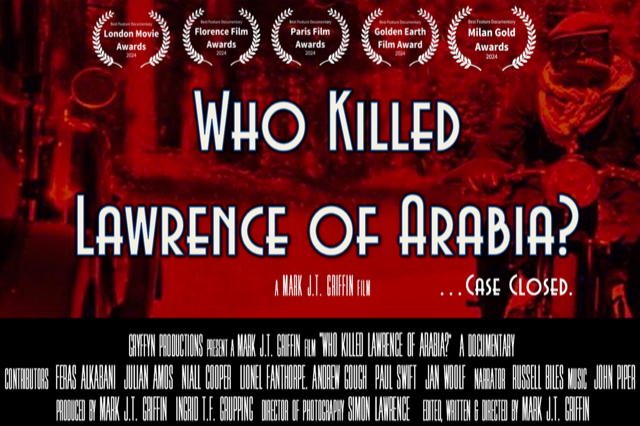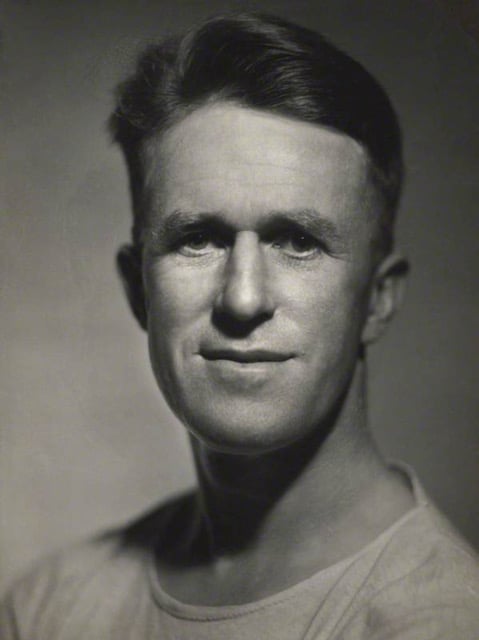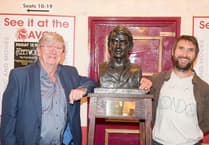The UK production of “Who Killed Lawrence of Arabia?”, written and directed by Forest of Dean film maker Mark J T Griffin, is gaining momentum and the feature length documentary is due for release on November 1.
The documentary provides an in-depth investigation into the motorcycle crash which ended the life of T E Lawrence better known as Lawrence of Arabia, whose maternal grandfather was born in Chepstow.
Uncovering compelling evidence the documentary aims to prove Lawrence’s crash was no accident but an assassination.
Expert input is provided by historians and investigators and the documentary is narrated by Russell Biles.
To support the story the film includes drama footage from Lawrence: After Arabia a full-length feature film, shot in Dorset, which was released in October 2021.

The film starred Hugh Fraser, Michael Maloney, Nicole Cox with the voice of Brian Cox and Tom Barber Duffy and won 32 awards at 20 festivals including Best Picture, Audience Award, Special Jury Prize, Best Director, Best Screenplay, Best Song and Best Soundtrack. The documentary is made by the same filmmakers.
The ensuing documentary investigates Lawrence’s fatal crash, his death and its aftermath and through investigation and document examination reveals a plethora of evidence for an assassination but none for an accident – challenging the official story.
The documentary is contemporary and relevant, directly connecting Lawrence’s military campaign a century ago in the Middle East to the current ongoing conflict.
The project is one which Mark Griffin has been working on for many years.
“I became interested in T E Lawrence when I was very young – I read about him and visited the places he was connected to around Dorset. Of course I saw David Lean’s “Lawrence of Arabia” with Peter O’Toole and some years later “Dangerous Man” with Ralph Fiennes. I always felt the mystery of his death had never been explored,” he explained.
“I always felt there was much more behind the story. Lawrence was involved in a motorcycle accident on his Brough Superior bike and died six days later. At the inquest a witness described seeing a black car just before Lawrence lost control of his bike which then careered into two boys on bikes.

“The more I researched this incident it seemed to me there had been a cover up – a conspiracy to get rid of Lawrence. He had been involved in infiltrating Moseley and the black-shirts, was in contact with King Abdullah of Trans-Jordan about an Arab uprising and was possibly being groomed for a job to reinvigorate the Secret Service.”
The documentary is Mark’s second foray into directing after he took the helm for the successful “Lawrence: After Arabia” which claimed 32 awards at 22 film festivals including Best Picture, Best Director and Jury and Audience Awards.
He is also the author of the non fiction book “Who Killed Lawrence of Arabia?” Which was written over ten years collating all the information we’d gathered in investigation.
“Our key challenge was the number of missing documents including accident records, autopsy and hospital records but book was published in August 2022, and it delves deeply into the crash approaching the death as a murder – who would benefit and who had the means, motive and opportunity to remove Lawrence,” explained Mark
“The film we made could only spend a few minutes on the crash and could not explore means, motive and opportunity – why Lawrence might want to be removed. The documentary over 100 minutes is easily able to do this using input from the team of Lawrence experts

“Expert input is provided by historians and investigators Andrew Gough, Rev. Lionel Fanthorpe, Niall Cooper, motorcycle expert Julian Amos, probability expert Paul Swift, writers and T.E. Lawrence experts Jan Woolf and senior lecturer in Arab studies Feras Alkabani from East Sussex University. We were able to shoot all the interviews in the TE Lawrence Room – his old bedroom – at Jesus College Oxford where he studied,” said Mark
The documentary also has an evocative sound-track most of which has been created by John Piper.
“I especially love the End Titles Theme, which is honestly sublime,” said Mark, who added that the documentary is set to the screened at selected venues around the UK including London, Oxford, Poole and Moreton – with the dates are on available on the www.lawrenceafterarabia.co.uk/events page.
With five awards for best feature documentary already attached to the film it’s certainly to be a popular choice with Lawrence fans when it arrives in Monmouth’s Savoy Theatre on November 2
Tickets are available now at www.lawrenceafterarabia.co.uk/events or directly from the Savoy at https://monmouth-savoy.ticketsolve.com/ticketbooth/shows/873664201





Comments
This article has no comments yet. Be the first to leave a comment.